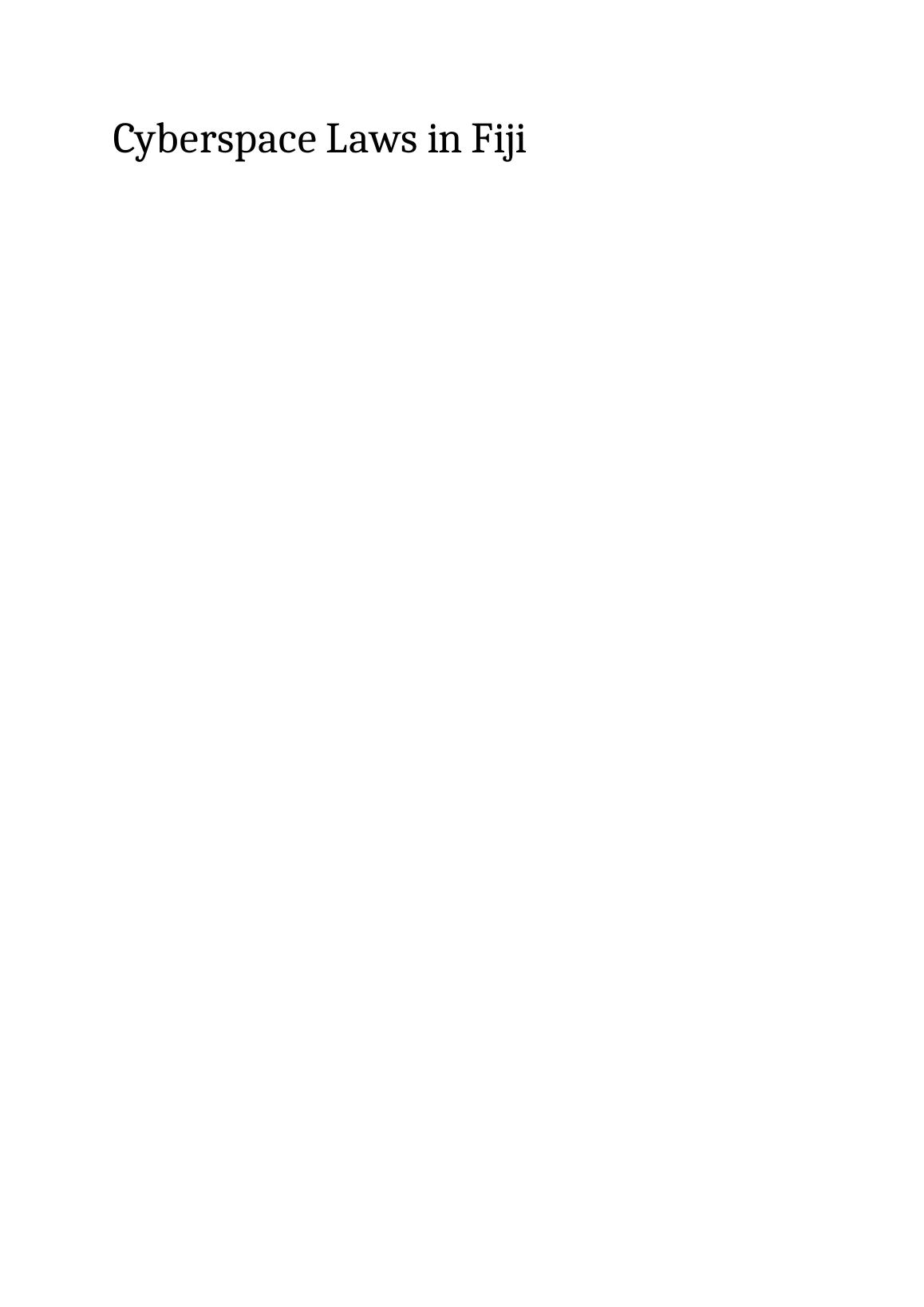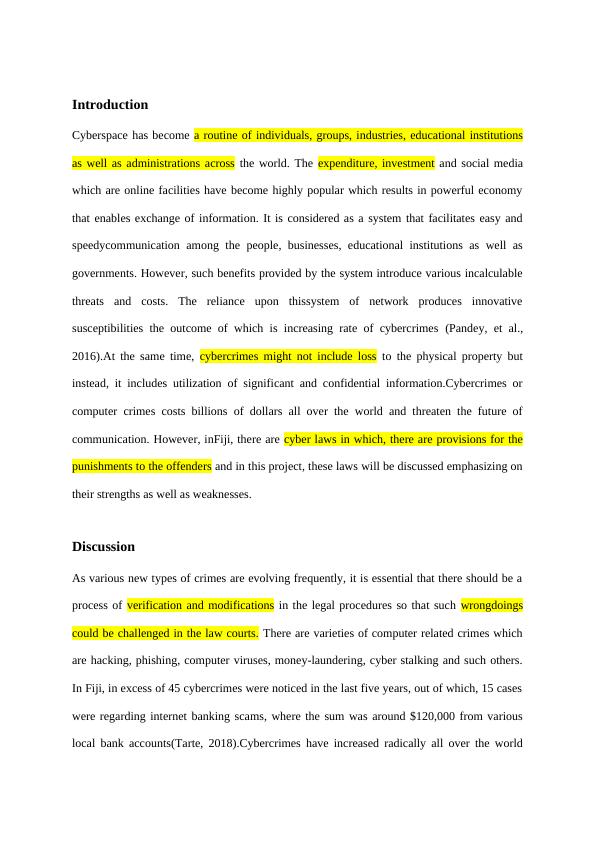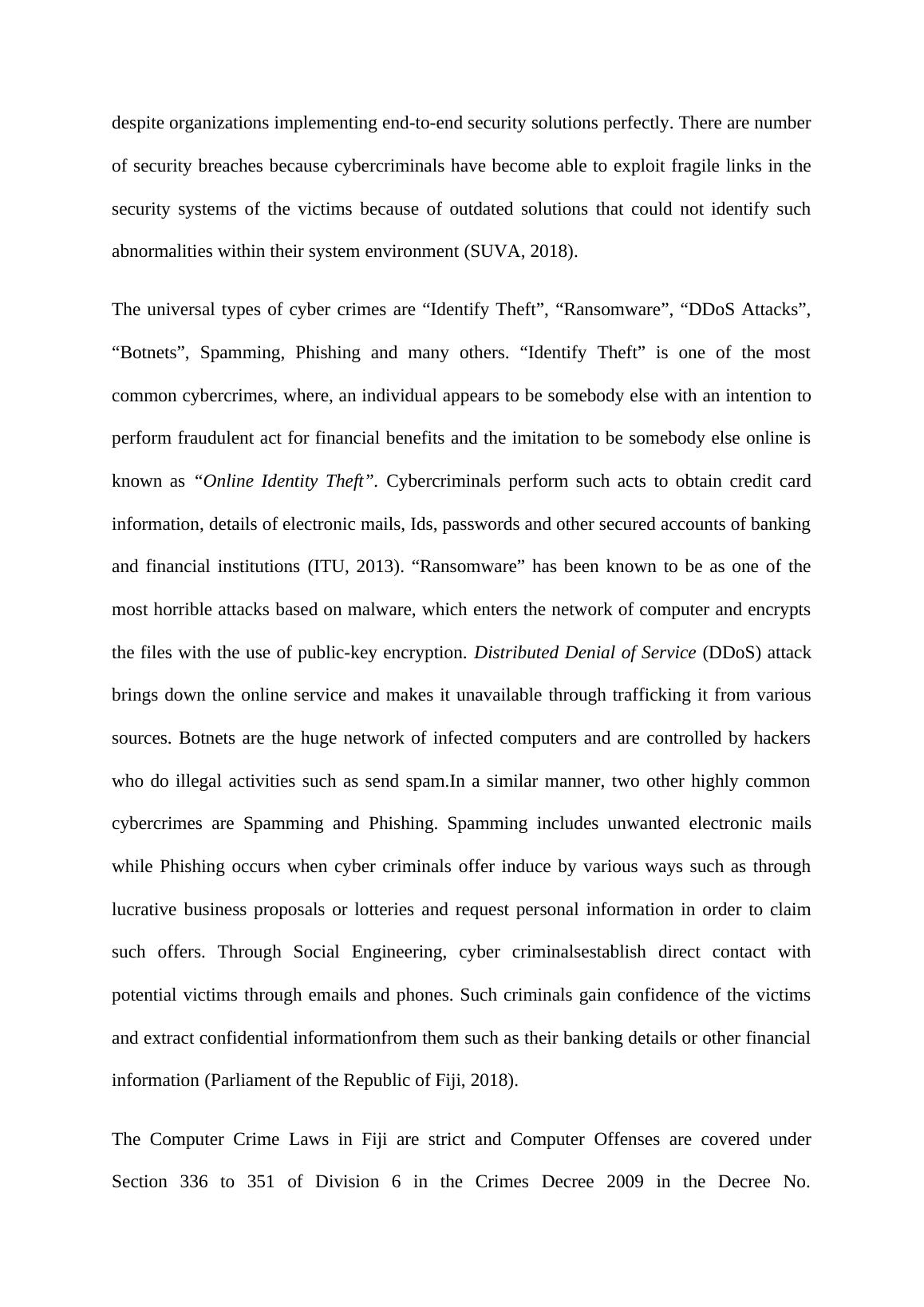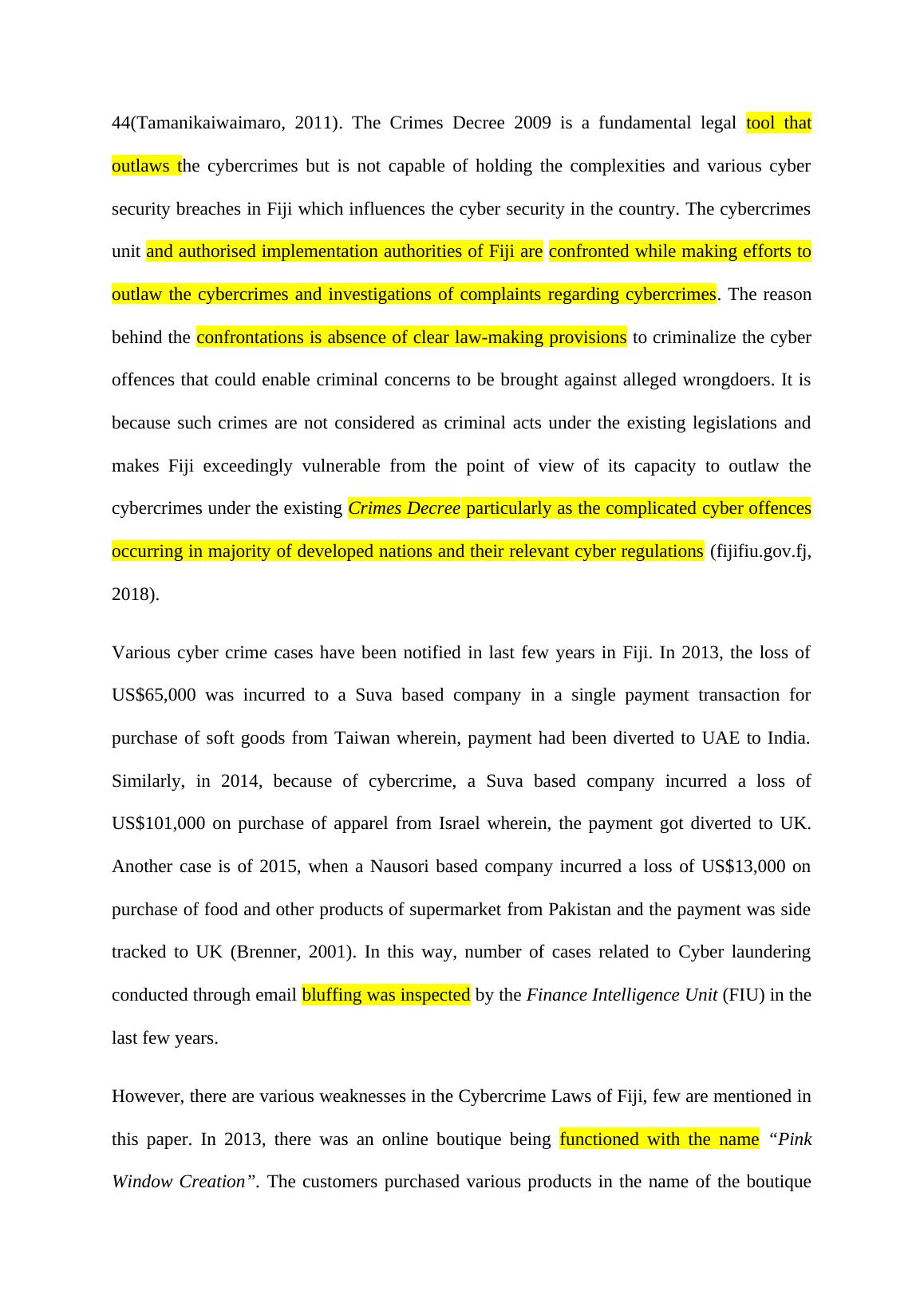Cyberspace Laws in Fiji: Strengths and Weaknesses
Added on 2023-06-04
11 Pages3028 Words87 Views
Cyberspace Laws in Fiji

Introduction
Cyberspace has become a routine of individuals, groups, industries, educational institutions
as well as administrations across the world. The expenditure, investment and social media
which are online facilities have become highly popular which results in powerful economy
that enables exchange of information. It is considered as a system that facilitates easy and
speedycommunication among the people, businesses, educational institutions as well as
governments. However, such benefits provided by the system introduce various incalculable
threats and costs. The reliance upon thissystem of network produces innovative
susceptibilities the outcome of which is increasing rate of cybercrimes (Pandey, et al.,
2016).At the same time, cybercrimes might not include loss to the physical property but
instead, it includes utilization of significant and confidential information.Cybercrimes or
computer crimes costs billions of dollars all over the world and threaten the future of
communication. However, inFiji, there are cyber laws in which, there are provisions for the
punishments to the offenders and in this project, these laws will be discussed emphasizing on
their strengths as well as weaknesses.
Discussion
As various new types of crimes are evolving frequently, it is essential that there should be a
process of verification and modifications in the legal procedures so that such wrongdoings
could be challenged in the law courts. There are varieties of computer related crimes which
are hacking, phishing, computer viruses, money-laundering, cyber stalking and such others.
In Fiji, in excess of 45 cybercrimes were noticed in the last five years, out of which, 15 cases
were regarding internet banking scams, where the sum was around $120,000 from various
local bank accounts(Tarte, 2018).Cybercrimes have increased radically all over the world
Cyberspace has become a routine of individuals, groups, industries, educational institutions
as well as administrations across the world. The expenditure, investment and social media
which are online facilities have become highly popular which results in powerful economy
that enables exchange of information. It is considered as a system that facilitates easy and
speedycommunication among the people, businesses, educational institutions as well as
governments. However, such benefits provided by the system introduce various incalculable
threats and costs. The reliance upon thissystem of network produces innovative
susceptibilities the outcome of which is increasing rate of cybercrimes (Pandey, et al.,
2016).At the same time, cybercrimes might not include loss to the physical property but
instead, it includes utilization of significant and confidential information.Cybercrimes or
computer crimes costs billions of dollars all over the world and threaten the future of
communication. However, inFiji, there are cyber laws in which, there are provisions for the
punishments to the offenders and in this project, these laws will be discussed emphasizing on
their strengths as well as weaknesses.
Discussion
As various new types of crimes are evolving frequently, it is essential that there should be a
process of verification and modifications in the legal procedures so that such wrongdoings
could be challenged in the law courts. There are varieties of computer related crimes which
are hacking, phishing, computer viruses, money-laundering, cyber stalking and such others.
In Fiji, in excess of 45 cybercrimes were noticed in the last five years, out of which, 15 cases
were regarding internet banking scams, where the sum was around $120,000 from various
local bank accounts(Tarte, 2018).Cybercrimes have increased radically all over the world

despite organizations implementing end-to-end security solutions perfectly. There are number
of security breaches because cybercriminals have become able to exploit fragile links in the
security systems of the victims because of outdated solutions that could not identify such
abnormalities within their system environment (SUVA, 2018).
The universal types of cyber crimes are “Identify Theft”, “Ransomware”, “DDoS Attacks”,
“Botnets”, Spamming, Phishing and many others. “Identify Theft” is one of the most
common cybercrimes, where, an individual appears to be somebody else with an intention to
perform fraudulent act for financial benefits and the imitation to be somebody else online is
known as “Online Identity Theft”. Cybercriminals perform such acts to obtain credit card
information, details of electronic mails, Ids, passwords and other secured accounts of banking
and financial institutions (ITU, 2013). “Ransomware” has been known to be as one of the
most horrible attacks based on malware, which enters the network of computer and encrypts
the files with the use of public-key encryption. Distributed Denial of Service (DDoS) attack
brings down the online service and makes it unavailable through trafficking it from various
sources. Botnets are the huge network of infected computers and are controlled by hackers
who do illegal activities such as send spam.In a similar manner, two other highly common
cybercrimes are Spamming and Phishing. Spamming includes unwanted electronic mails
while Phishing occurs when cyber criminals offer induce by various ways such as through
lucrative business proposals or lotteries and request personal information in order to claim
such offers. Through Social Engineering, cyber criminalsestablish direct contact with
potential victims through emails and phones. Such criminals gain confidence of the victims
and extract confidential informationfrom them such as their banking details or other financial
information (Parliament of the Republic of Fiji, 2018).
The Computer Crime Laws in Fiji are strict and Computer Offenses are covered under
Section 336 to 351 of Division 6 in the Crimes Decree 2009 in the Decree No.
of security breaches because cybercriminals have become able to exploit fragile links in the
security systems of the victims because of outdated solutions that could not identify such
abnormalities within their system environment (SUVA, 2018).
The universal types of cyber crimes are “Identify Theft”, “Ransomware”, “DDoS Attacks”,
“Botnets”, Spamming, Phishing and many others. “Identify Theft” is one of the most
common cybercrimes, where, an individual appears to be somebody else with an intention to
perform fraudulent act for financial benefits and the imitation to be somebody else online is
known as “Online Identity Theft”. Cybercriminals perform such acts to obtain credit card
information, details of electronic mails, Ids, passwords and other secured accounts of banking
and financial institutions (ITU, 2013). “Ransomware” has been known to be as one of the
most horrible attacks based on malware, which enters the network of computer and encrypts
the files with the use of public-key encryption. Distributed Denial of Service (DDoS) attack
brings down the online service and makes it unavailable through trafficking it from various
sources. Botnets are the huge network of infected computers and are controlled by hackers
who do illegal activities such as send spam.In a similar manner, two other highly common
cybercrimes are Spamming and Phishing. Spamming includes unwanted electronic mails
while Phishing occurs when cyber criminals offer induce by various ways such as through
lucrative business proposals or lotteries and request personal information in order to claim
such offers. Through Social Engineering, cyber criminalsestablish direct contact with
potential victims through emails and phones. Such criminals gain confidence of the victims
and extract confidential informationfrom them such as their banking details or other financial
information (Parliament of the Republic of Fiji, 2018).
The Computer Crime Laws in Fiji are strict and Computer Offenses are covered under
Section 336 to 351 of Division 6 in the Crimes Decree 2009 in the Decree No.

44(Tamanikaiwaimaro, 2011). The Crimes Decree 2009 is a fundamental legal tool that
outlaws the cybercrimes but is not capable of holding the complexities and various cyber
security breaches in Fiji which influences the cyber security in the country. The cybercrimes
unit and authorised implementation authorities of Fiji are confronted while making efforts to
outlaw the cybercrimes and investigations of complaints regarding cybercrimes. The reason
behind the confrontations is absence of clear law-making provisions to criminalize the cyber
offences that could enable criminal concerns to be brought against alleged wrongdoers. It is
because such crimes are not considered as criminal acts under the existing legislations and
makes Fiji exceedingly vulnerable from the point of view of its capacity to outlaw the
cybercrimes under the existing Crimes Decree particularly as the complicated cyber offences
occurring in majority of developed nations and their relevant cyber regulations (fijifiu.gov.fj,
2018).
Various cyber crime cases have been notified in last few years in Fiji. In 2013, the loss of
US$65,000 was incurred to a Suva based company in a single payment transaction for
purchase of soft goods from Taiwan wherein, payment had been diverted to UAE to India.
Similarly, in 2014, because of cybercrime, a Suva based company incurred a loss of
US$101,000 on purchase of apparel from Israel wherein, the payment got diverted to UK.
Another case is of 2015, when a Nausori based company incurred a loss of US$13,000 on
purchase of food and other products of supermarket from Pakistan and the payment was side
tracked to UK (Brenner, 2001). In this way, number of cases related to Cyber laundering
conducted through email bluffing was inspected by the Finance Intelligence Unit (FIU) in the
last few years.
However, there are various weaknesses in the Cybercrime Laws of Fiji, few are mentioned in
this paper. In 2013, there was an online boutique being functioned with the name “Pink
Window Creation”. The customers purchased various products in the name of the boutique
outlaws the cybercrimes but is not capable of holding the complexities and various cyber
security breaches in Fiji which influences the cyber security in the country. The cybercrimes
unit and authorised implementation authorities of Fiji are confronted while making efforts to
outlaw the cybercrimes and investigations of complaints regarding cybercrimes. The reason
behind the confrontations is absence of clear law-making provisions to criminalize the cyber
offences that could enable criminal concerns to be brought against alleged wrongdoers. It is
because such crimes are not considered as criminal acts under the existing legislations and
makes Fiji exceedingly vulnerable from the point of view of its capacity to outlaw the
cybercrimes under the existing Crimes Decree particularly as the complicated cyber offences
occurring in majority of developed nations and their relevant cyber regulations (fijifiu.gov.fj,
2018).
Various cyber crime cases have been notified in last few years in Fiji. In 2013, the loss of
US$65,000 was incurred to a Suva based company in a single payment transaction for
purchase of soft goods from Taiwan wherein, payment had been diverted to UAE to India.
Similarly, in 2014, because of cybercrime, a Suva based company incurred a loss of
US$101,000 on purchase of apparel from Israel wherein, the payment got diverted to UK.
Another case is of 2015, when a Nausori based company incurred a loss of US$13,000 on
purchase of food and other products of supermarket from Pakistan and the payment was side
tracked to UK (Brenner, 2001). In this way, number of cases related to Cyber laundering
conducted through email bluffing was inspected by the Finance Intelligence Unit (FIU) in the
last few years.
However, there are various weaknesses in the Cybercrime Laws of Fiji, few are mentioned in
this paper. In 2013, there was an online boutique being functioned with the name “Pink
Window Creation”. The customers purchased various products in the name of the boutique

End of preview
Want to access all the pages? Upload your documents or become a member.
Related Documents
Cyber Laws: Examples of Cybercrime, Personal Information in E-commerce, Emerging Online Frauds, Trade Secretslg...
|8
|2369
|81
Preventive Measures Against Identity Crime and Consumer Scamslg...
|9
|2330
|491
Computer Criminals, IoT, CRM and Communication Methods for Organizationslg...
|10
|3100
|491
DDOS attacklg...
|5
|1194
|491
Cyber Security: A Review of Cyber Dependent Crimes and Techniques Used by Expertslg...
|5
|1329
|138
Digital Security: Principles, Cryptography, Secure Programming Techniqueslg...
|16
|3334
|170
